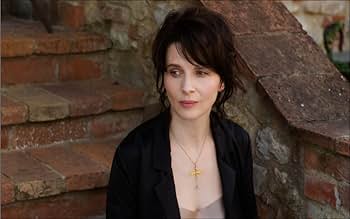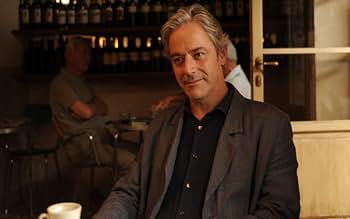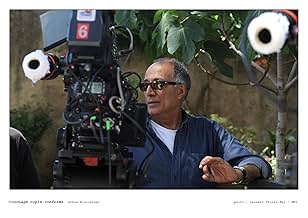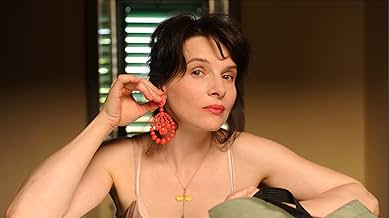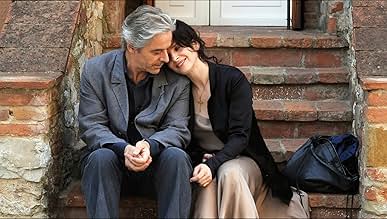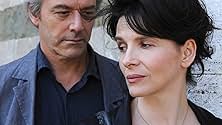In Toscana per promuovere il suo ultimo libro, uno scrittore britannico di mezza età incontra una donna francese che lo porta nel villaggio di Lucignano. Mentre sono lì, una domanda casuale ... Leggi tuttoIn Toscana per promuovere il suo ultimo libro, uno scrittore britannico di mezza età incontra una donna francese che lo porta nel villaggio di Lucignano. Mentre sono lì, una domanda casuale rivela qualcosa di più profondo.In Toscana per promuovere il suo ultimo libro, uno scrittore britannico di mezza età incontra una donna francese che lo porta nel villaggio di Lucignano. Mentre sono lì, una domanda casuale rivela qualcosa di più profondo.
- Regia
- Sceneggiatura
- Star
- Premi
- 11 vittorie e 29 candidature totali
- Le marié
- (as Filippo Troiano)
- La mariée
- (as Manuela Balsinelli)
Recensioni in evidenza
The Review: Juliette Binoche has had a career spanning nearly thirty years, and for much of that has jumped between roles in her natural language and English. You might think that, with the supposed paucity of good female roles in movies, that there's not much left for Binoche to cover that she hasn't before, but here she gets to explore some new territory to Cannes best actress award-winning effect. In the process, she gets to cover a range of languages, not only English and French but Italian, but in this case there is a specific purpose to the variances of the language.
The set-up is simple: William Shimell plays James Miller, an British author on a tour of Tuscany where his work on originality in art has been better received than in his homeland. Binoche is the woman who comes to hear his talk, and the two are then drawn together in a discussion of his work. Once the two meet again, the course of the movie charts their discussions over the course of an afternoon, taking in the Italian countryside and engaging with a number of characters along the way who cause them to reflect on their differing viewpoints on Miller's work.
There's a turning point as we approach the halfway mark where one of those characters seemingly mistakes the pair for a married couple. What starts as a role play, set off by the misunderstanding, takes on more and more aspects, and eventually both the pair and the audience are lost in the drama. The whole movie reveals itself to be an intricate construct on this concept, almost every aspect of the theme, the performances or the setting playing with the motif of originality versus imitation. Reflections in car windows sometimes obscure the actors themselves, POV shots ask us to engage directly in the drama almost as a participant and this even extends to the leading pair themselves – Shimell is a renowned baritone, not an actor, and there is a slight but noticeable difference between his performance and that of Binoche, which almost feels like a copy of acting rather than being fully immersed in the role.
While this reinforces the concept, it does prevent the audience from fully engaging, being kept slightly at arm's length by the constant artifice. That's not to say that there's not a lot to enjoy here, with the confusions and the tensions making this verge on a romantic comedy at times. Despite the differences in acting ability, Shimell and Binoche make an engaging couple at times and as time wears on, you find yourself more keen to believe that the beginning was the illusion and that their relationship is real and not the copy. Much of the credit for this must be placed at Binoche's door, using the language differences to vary mood effectively, but also adding colour and emotion in all of the languages she uses. The only one here who's on familiar ground is director Kiarostami, who's explored these themes before but never to such mainstream effect – worth checking out if you'd like to engage your mind and your heart.
Why see it at the cinema: There is a very literal aspect of the visuals which runs throughout the course of the movie, which the cinema screen will allow you to fully appreciate.
The score: 7/10
They stop in a museum before the picture of a portrait, thought for centuries to be the original, though lately discovered to have been only a perfect copy. What value has changed in this object, what new perception now regards it, this is where I believe this is best unraveled.
Things change the man quips philosophically, an intellectual much like Kiarostami perhaps. Yet we see the same cypresses standing by the same old road, the same plazas and hotels they once visited, then young and booming with love. Having spoken so well, we see however that the man understands little of that. He can't even enjoy a simple glass of wine without complaining that it is corked, what should be a simple pleasure is tainted by the gross irritation that comes from too much satisfaction. Having satisfied our desires so many times, in so many different ways, we can see that we are no closer to happiness.
Where does this weariness then, born from too much familiarity, from having seen or tasted too much, come from and why does it invest our gaze with this constant dissatisfaction? Another line of thought to connect the web of allusions. The woman, who has made herself beautiful for him in the day of their anniversary, says he doesn't see her anymore. He looks at her but doesn't see, meaning something has dissipated with time, grown withered in his eyes, though she is still the same, except a little older.
Kiarostami perfectly visualizes the burden that saddles these people in the scene where they are driving around town in the car. On the windshield we see cast over their faces the reflections of buildings gliding by, not simply the gap that exists between them, indeed between any two human beings, but the burden of time, life passing them over. In a poignant metaphor, we see them move through existence.
A perfect copy, the original, two identical objects which we are taught to perceive differently. The lines being the same in the same places, the hues of color painted exactly the same, the one intrinsic value that separates the two is merely time. Which is to say that as humans, who wither away with time, we allow ourselves to regard it as the most precious good, the one we cannot buy or sell. The movie shows us how, although we may understand our transience as an idea, we live as though we will always be here, as though we have time enough to postpone a small gesture of affection.
But if we simply perceive the world around us, this present moment? This draught of air now coming from an open window or this glass of wine? Or indeed this woman who has made herself beautiful for us?
This is a great film by one of the few gifted filmmakers of our times, perhaps his first truly great one. In the right ears, this will be a sutra that will permit us to meditate on fundamental precepts of existence, how time thought to matter matters little, how craving and ego blind us. How ultimately, like a mandala upon which Tibetan monks work tirelessly day and night only to destroy it upon completion, life is to be lived in full, with knowledge that it will come to pass.
It's really enjoyable with unexpected progress of the story (unexpected especially if you're brainwashed by certain type of movies about male-female relationships). It has room for interpretation, everything is not explained and it lets the viewer bind the remaining threads. It's also funny and I found it quite intense. It held my attention and actually felt about ten minutes shorter than it really is. I have to admit that I'm a big fan of intelligent movies about male-female relationships. Long well written and acted scenes with just a man and a woman talking don't turn me off.
The formal control of the shots by the director and the cinematographer are masterful. There are those long shots that Kiarostami has used before, but used masterfully in the context of the story, and not in any "look at me, Mom, I'm sculpting in time" -art house tedium.
I talked with couple other persons who saw the movie, and they said that they didn't like it. But let me tell you that it's really good.
He comes to her antique shop and invites her to drive around. However, she takes James to the village of Lucignano. While they are traveling, he autographs six books she had bought and they discuss the subject of his book. When they arrive in the village, they are mistakenly taken as husband and wife and the woman decides to play the game and soon the bitter James Miller assumes the role of her husband.
I am not a fan of Abbas Kiarostami, but I see his movies since they are usually challenging and open to interpretations. I have just seen "Copie Conforme" on DVD and I have my understanding of the story that may be or may be not the real intention of this Iranian writer / director.
Juliette Binoche's character definitely knows James Miller and there are evidences: first, she has a reserved spot in his lecture; then her son comments that she had decided to fall in love with the British writer; last, when James arrives in her antique shop, they do not introduce themselves to each other and they are not too formal as strangers certainly would be.
I believe that James Miller first met her years ago while she was walking on street with her son following her but never together. She probably would be a single mother with rejection to her son and on that occasion they might have become lovers or they had at least a love affair in the hotel that they visit in the end but James probably would be married.
They travel to the romantic village of Lucignano and they have a long discussion about copies and originals art works. When the owner of the cafeteria believes that they are married, the French woman plays games with James Miller pretending that they have been married for fifteen years, probably because she might have wanted to be his wife in the past. In the end, there is a parallel with the central subject of the story, copies vs. originals, and the drama turns into a faithful copy of a romantic comedy with a long-term marriage. My vote is seven.
Title (Brazil):"Cópia Fiel ("Faithful Copy")
Lo sapevi?
- QuizDuring a visit in Tehran by Juliette Binoche, Abbas Kiarostami told Binoche the synopsis of Certified Copy as a casual anecdote, which she said that she fully believed until he confessed to having made it up. According to Kiarostami, studying the reactions of Binoche as she listened to the story was a vital part of the film's further development.
- Citazioni
James Miller: It seems to me that the human race is the only species who have forgotten the whole purpose of life, the whole meaning of existence is to have fun, to have pleasure. And here is someone who's found their own way to do it. We shouldn't judge them for it. If they're happy and enjoying life, we should congratulate them, not criticize them.
- ConnessioniFeatured in Breakfast: Episodio datato 31 agosto 2010 (2010)
- Colonne sonoreO surdato 'nnamurrato
Written by Aniello Califano (as A. Califano) and the music by Enrico Cannio (as E. Cannio)
I più visti
- How long is Certified Copy?Powered by Alexa
Dettagli
- Data di uscita
- Paesi di origine
- Siti ufficiali
- Lingue
- Celebre anche come
- Certified Copy
- Luoghi delle riprese
- Aziende produttrici
- Vedi altri crediti dell’azienda su IMDbPro
Botteghino
- Budget
- 7.000.000 € (previsto)
- Lordo Stati Uniti e Canada
- 1.373.975 USD
- Fine settimana di apertura Stati Uniti e Canada
- 77.937 USD
- 13 mar 2011
- Lordo in tutto il mondo
- 7.736.632 USD
- Tempo di esecuzione1 ora 46 minuti
- Colore
- Mix di suoni
- Proporzioni
- 1.85 : 1




